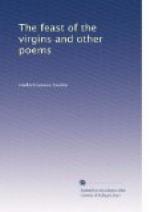Father Rene Menard [L]—it was he,
long
lost to his Jesuit brothers,
Sent forth by an holy decree
to
carry the Cross to the heathen.
In his old age abandoned to die,
in
the swamps, by his timid companions,
He prayed to the Virgin on high,
and
she led him forth from the forest;
For angels she sent him as men—
in
the forms of the tawny Dakotas,
And they led his feet from the fen,
from
the slough of despond and the desert,
Half dead in a dismal morass,
as
they followed the red-deer they found him,
In the midst of the mire and the grass,
and
mumbling “Te Deum laudamus.”
“Unktomee[72]—Ho!” muttered
the braves,
for
they deemed him the black Spider-Spirit
That dwells in the drearisome caves,
and
walks on the marshes at midnight,
With a flickering torch in his hand,
to
decoy to his den the unwary.
His tongue could they not understand,
but
his torn hands all shriveled with famine
He stretched to the hunters and said:
“He
feedeth his chosen with manna;
And ye are the angels of God
sent
to save me from death in the desert.”
His famished and woe-begone face,
and
his tones touched the hearts of the hunters;
They fed the poor father apace,
and
they led him away to Ka-tha-ga.
[L] See the account of Father Menard, his mission and disappearance in the wilderness. Neill’s Hist. Minnesota, pp 104-107, inc.
There little by little he learned
the
tongue of the tawny Dakotas;
And the heart of the good father yearned
to
lead them away from their idols—
Their giants[16] and dread Thunder-birds—
their
worship of stones[73] and the devil.
“Wakan-de!"[M] they answered his words,
for
he read from his book in the Latin,
Lest the Nazarene’s holy commands
by
his tongue should be marred in translation;
And oft with his beads in his hands,
or
the cross and the crucified Jesus,
He knelt by himself on the sands,
and
his dim eyes uplifted to heaven.
But the braves bade him look to the East—
to
the silvery lodge of Han-nan-na;[N]
And to dance with the chiefs at the feast—
at
the feast of the Giant Heyo-ka.[16]
They frowned when the good father spurned
the
flesh of the dog in the kettle,
And laughed when his fingers were burned
in
the hot, boiling pot of the giant.
“The Black-robe” they called the poor
priest,
from
the hue of his robe and his girdle;
And never a game or a feast
but
the father must grace with his presence.
His prayer-book the hunters revered,—
they
deemed it a marvelous spirit;




